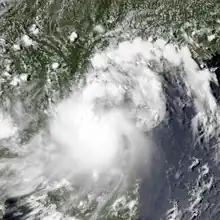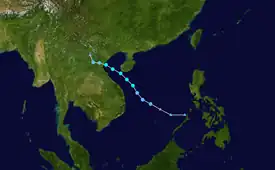 Tropical Storm Mangkhut at peak intensity approaching Vietnam on August 7 | |
| Meteorological history | |
|---|---|
| Formed | August 5, 2013 |
| Dissipated | August 8, 2013 |
| Tropical storm | |
| 10-minute sustained (JMA) | |
| Highest winds | 75 km/h (45 mph) |
| Lowest pressure | 992 hPa (mbar); 29.29 inHg |
| Tropical storm | |
| 1-minute sustained (SSHWS/JTWC) | |
| Highest winds | 85 km/h (50 mph) |
| Lowest pressure | 989 hPa (mbar); 29.21 inHg |
| Overall effects | |
| Fatalities | 4 |
| Missing | 5 |
| Damage | $56.1 million (2013 USD) |
| Areas affected | |
| IBTrACS / [1][2] | |
Part of the 2013 Pacific typhoon season | |
Tropical Storm Mangkhut, known in the Philippines as Tropical Depression Kiko, was a storm that made landfall in Vietnam during August 7 and 8, 2013. At least 3 people were killed, due to strong winds and flash floods. Mangkhut was the first storm to form during August and nearly had the same track as Tropical Storm Jebi a week prior.
Meteorological history

Tropical storm (39–73 mph, 63–118 km/h)
Category 1 (74–95 mph, 119–153 km/h)
Category 2 (96–110 mph, 154–177 km/h)
Category 3 (111–129 mph, 178–208 km/h)
Category 4 (130–156 mph, 209–251 km/h)
Category 5 (≥157 mph, ≥252 km/h)
Unknown
A broad low pressure area formed east of Mindanao, Philippines on August 3, after Jebi made landfall over northern Vietnam and dissipated. Early on August 5, the JMA and PAGASA reported that a tropical depression had developed within a favourable environment for further development, about 145 km (90 mi) to the northeast of Puerto Princesa in Palawan with the latter naming it as Kiko.[3][4][5]
Later that day as the system consolidated further the JMA reported that the depression had developed into a tropical storm and named it Mangkhut, before the JTWC initiated advisories and designated it as Tropical Depression 10W.[3][6][7]
Over the next couple of days the system moved towards the north-northwest before it made landfall in Northern Vietnam during August 7. Later that day, it was said that 2 people died due to strong winds and falling debris. On August 8, Mangkhut was weakened to a tropical depression by the JMA, and JTWC later that day. Mangkhut was then last noted early the next day as it dissipated over Laos. During August 9, a total of 3 people were killed.[3]
Impact
Vietnam
In the afternoon of August 7, a teenager named Pham Thanh Son (16 years old, resident of Dang Giang Ward, Ngo Quyen District) heard information about Mangkhut affecting Hai Phong, so he and his three friends took two motorbikes to go watch the storm. All 4 people stopped at the beach area in front of the Hai Yen hotel to watch the waves. Son ran along the embankment all by himself, and he was suddenly swept into the sea by the waves.[8][9][10] Downpours throughout Wednesday night, August 7 until Thursday, August 8 dropped rainfall 80 mm (3.1 in) deep on streets of the capital, causing difficulties for many people going to work. Meanwhile, rainfall totals went up to about 300 mm (12 in) in central Thanh Hóa and northern Hai Phong city, with wind speeds hitting 62–88 km/h (40–55 mph).[11][12]
Tropical Storm Mangkhut weakened as it made landfall over Thanh Hóa Province and Ninh Bình Province delta late evening on 7 August. A peak gust of 30 m/s was recorded at Nam Dinh, and accumulated precipitation total during the time of Mangkhut over Southeast part of Vietnam was 336mm which was recorded at Ky Anh. A central pressure value of 992.2mb was also recorded at 15:20 UTC in Thanh Hoa city. Four persons were killed, five were injured due to the impact of Mangkhut.[1]
Total damage in Vietnam reached 1.3 trillion dong (US$56.1 million).[13][14]
See also
References
- 1 2 Vietnamese National Center for Hydro Meteorological Forecasts (December 11, 2013). Member Report: Vietnam (PDF). ESCAP/WMO Typhoon Committee: 8th Integrated Workshop/2nd TRCG Forum. ESCAP/WMO Typhoon Committee. Archived (PDF) from the original on January 25, 2014. Retrieved December 11, 2013.
- ↑ "Thai Meteorological Department - Warning". Archived from the original on 2021-04-05. Retrieved 2017-07-16.
- 1 2 3 Tropical Storm Mangkhut (RSMC Tropical Cyclone Best Track). Japan Meteorological Agency. August 20, 2013. Archived from the original on August 21, 2013. Retrieved October 1, 2013.
- ↑ "Tropical Cyclone Alert: Tropical Depression "Kiko" August 5, 2013 09z". Philippine Atmospheric, Geophysical and Astronomical Services Administration. Archived from the original on September 20, 2013. Retrieved October 1, 2013.
- ↑ "Tropical Cyclone Formation Alert August 5, 2013 09z". Joint Typhoon Warning Center. August 5, 2013. Archived from the original on October 10, 2013. Retrieved October 1, 2013.
- ↑ "Prognostic Reasoning for Tropical Storm 10W (Mangkhut) Warning Nr 01". Joint Typhoon Warning Center. August 5, 2013. Archived from the original on October 10, 2013. Retrieved October 1, 2013.
- ↑ "RSMC Tropical Cyclone Advisory August 5, 2013 12z". RSMC Tokyo — Typhoon Center. Archived from the original on August 7, 2013. Retrieved October 1, 2013.
- ↑ Biên, Quốc (2013-08-08). "Ra Đồ Sơn xem bão, bị sóng cuốn trôi". VnExpress (in Vietnamese). Archived from the original on 2014-01-18. Retrieved 2014-01-06.
- ↑ Minh Khang (August 7, 2013). "Đi xem bão, một thiếu niên bị sóng cuốn xuống biển". Vtc.vn (in Vietnamese). Archived from the original on 2014-01-10. Retrieved 2014-01-06.
- ↑ Giang Chinh (2013-08-08). "Đi đón bão số 6, một thanh niên bị sóng cuốn mất tích". Báo An ninh Thủ đô (in Vietnamese). Archived from the original on 2014-01-17. Retrieved 2014-01-06.
- ↑ "Storm Mangkhut weakens to tropical low pressure, causing torrential rain in northern Vietnam". Xinhua. August 8, 2013. Archived from the original on October 7, 2013. Retrieved October 1, 2013.
- ↑ "Aftermath of tropical storm Mangkhut in Vietnam". Xinhua. August 8, 2013. Archived from the original on October 7, 2013. Retrieved October 1, 2013.
- ↑ "Các địa phương khắc phục thiệt hại do bão số 6 - Báo Nhân Dân điện tử". www.nhandan.com.vn. Archived from the original on 30 August 2019. Retrieved 12 January 2022.
- ↑ "Tổng Hợp Thiệt Hại Do Thiên Tai Năm" (PDF) (in Vietnamese). 2013. Archived from the original (PDF) on 2021-11-03.
External links
- JMA General Information of Tropical Storm Mangkhut (1310) from Digital Typhoon
- JMA Best Track Data of Tropical Storm Mangkhut (1310) (in Japanese)
- JTWC Best Track Data of Tropical Storm 10W (Mangkhut)
- 10W.MANGKHUT from the U.S. Naval Research Laboratory
